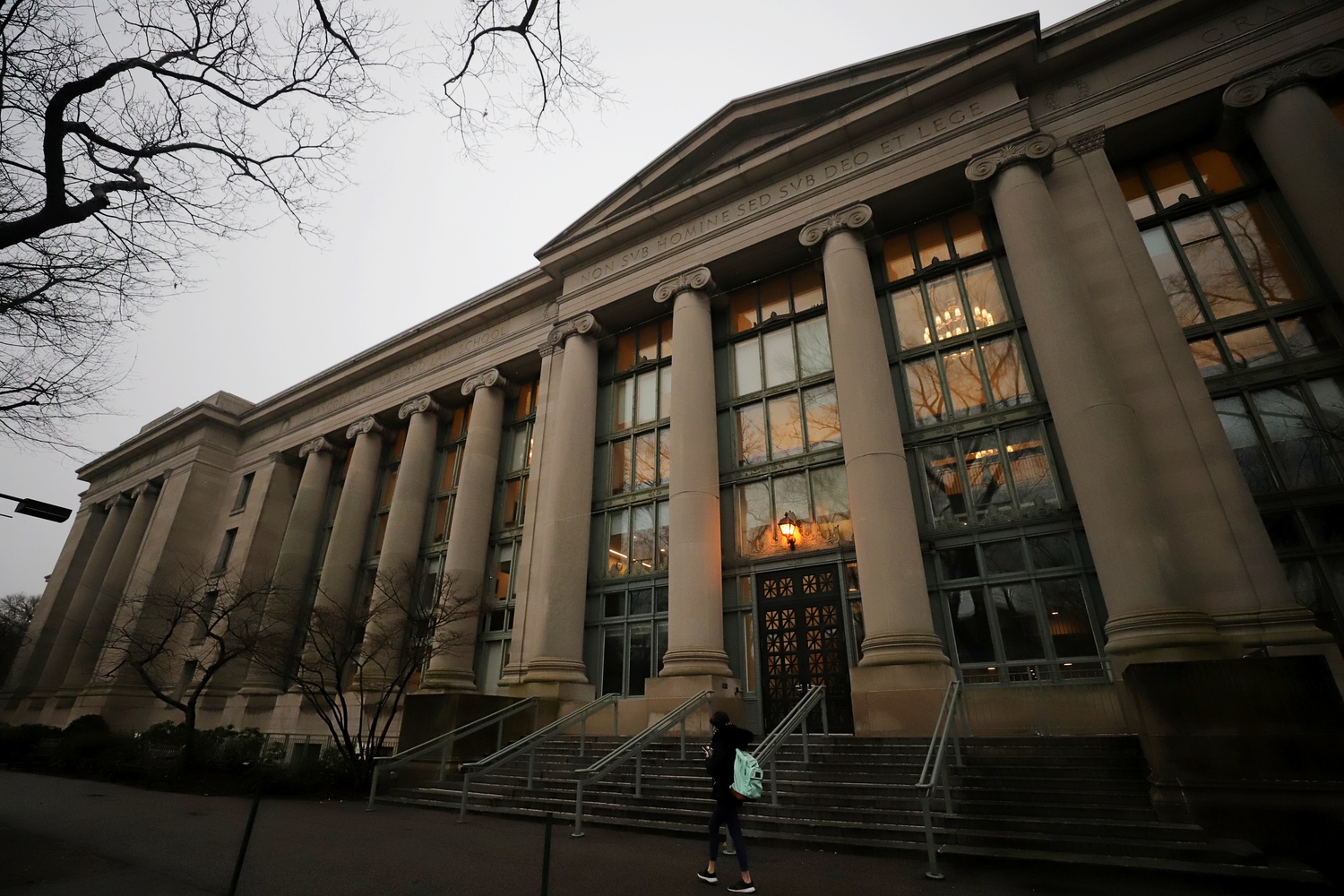
News
Summers Will Not Finish Semester of Teaching as Harvard Investigates Epstein Ties

News
Harvard College Students Report Favoring Divestment from Israel in HUA Survey

News
‘He Should Resign’: Harvard Undergrads Take Hard Line Against Summers Over Epstein Scandal

News
Harvard To Launch New Investigation Into Epstein’s Ties to Summers, Other University Affiliates

News
Harvard Students To Vote on Divestment From Israel in Inaugural HUA Election Survey
Institutional Neutrality Is Impossible. Harvard Must Accept That Fact.
Last May, in response to growing campus unrest surrounding the war in Gaza, Harvard announced a new “Institutional Voice” policy, a version of institutional neutrality. Harvard, its administrators, and its board members would not release any statements or assume any stance on controversial public issues, speaking only on matters directly related to core academic functions.
Yet, in the past two years, Harvard has shuttered its DEI offices, taken down political signage, and heightened protest restrictions, providing little clarity regarding the motive behind these changes or guidance for students to move forward. Sound institutionally neutral? I didn’t think so.
The inconsistency of Harvard’s claim of institutional neutrality is not news. Since the policy was adopted, faculty and students alike have warned of the dubiousness of its goal to remain a perfectly impartial institution. But now, the stakes are higher than ever.
Case in point: C. Adrian C. Vermuele ’90, who joined Harvard Law School in 2006 as a professor, has become a highly influential legal scholar, and for the past five years has played a role in weakening the integrity of American democracy. In 2020, he published an article in The Atlantic calling for a new form of legal thought, common-good constitutionalism, demanding that the law be interpreted in a way that best serves the “common good.”
At first, I was intrigued by the idea. I’ve previously argued that Harvard must let basic moral principles shape its actions, principles that ultimately tie back to a concern for the common good. But Vermeule’s “common good” is hardly deserving of the name. In several tweets in 2020, he joined President Donald Trump in calling into question the legitimacy of the presidential election. In a recent New York Times op-ed, he suggested Trump would be justified in ignoring some orders of lower courts that limit his power. As multiple legal scholars have warned, common good constitutionalism lays the groundwork for authoritarianism, not liberty.
Despite all this, HLS has held its tongue, even after a 2021 petition calling for an administrative condemnation of Vermeule’s speech. It’s true that we all have a different vision for the way the world should be. Some might argue that Vermeule’s interpretation of the Constitution simply represents one of those visions and therefore should be left alone. The trouble with that view is this: Choosing to let Vermeule’s views circulate without an institutional response is hardly neutral. Indeed, the current political moment demands more than indifference to such dangerous rhetoric. It’s clear that the “common good” that Vermeule imagines lies not in protecting individual rights, but rather in directly upending them.
Like it or not, the University exercises its own form of speech even without grand public statements. Its speech weasels its way through campus policies, rules, and guidelines. Its speech rears its head when Harvard applies some rules and ignores others. Its speech becomes louder in silence.
Consider Harvard College Dean David J. Deming’s failure to condemn language echoing that of Adolf Hitler in the Harvard Salient, a conservative student publication. When asked to review or comment on this language, Deming declined, stating that the College had not received any formal complaints and therefore would not investigate the piece without one.
The University’s choice to stand idly by in the face of this extreme speech is far from neutral. Harvard should have the moral integrity to stand against hateful, discriminatory rhetoric in all its forms, whether it comes from an undergraduate conservative publication or a prominent legal scholar. By setting forth an environment of inclusion and confirming a belief in human rights, the University would allow students to feel supported and empowered. In this way, Harvard wouldn’t stifle discourse, it would catalyze it.
Disagreement is not only beneficial but critical to education. However, Vermeule’s messaging – and the Salient's article — extend beyond mere differences of opinion: They violate basic ideas of equality and justice. By allowing hateful speech to fester through faculty appointments and student organizations, Harvard normalizes it. The University accepts authoritarianism and fascism not as ideas to condemn but as a regular part of discourse, as something to respectfully disagree with, rather than vehemently condemn.
Claiming that Harvard participates in institutional neutrality is like claiming that the Supreme Court is apolitical, the police impartial, and the economy perfectly balanced. Harvard’s own rules and regulations, and, more importantly, the method and extent to which they are applied, will never be neutral. Its viewpoints bleed through every aspect of campus, not through the statements they release or words they speak, but rather the actions they take, and, more importantly, the ones they don’t.
For Harvard, institutional neutrality is a convenient cop-out. In the face of intense public, political, and financial scrutiny, urging the University to pick a side, it can remove itself from the equation entirely. Meanwhile, Harvard’s partisanship lurks in the decisions it inevitably has to make.
This is not a call on Harvard to fire its professors or disband its student organizations. But even Harvard President Alan M. Garber ’76 himself recognized the limitations of a university completely cut-off from the world it inhabits and the students it serves. The current political landscape demands more than vague, corporate messages using buzzwords like viewpoint diversity or intellectual vitality. It demands a University with a backbone.
Sylvia A. Langer ’28, a Crimson Editorial editor, is a Molecular and Cellular Biology concentrator in Currier House.
Want to keep up with breaking news? Subscribe to our email newsletter.

